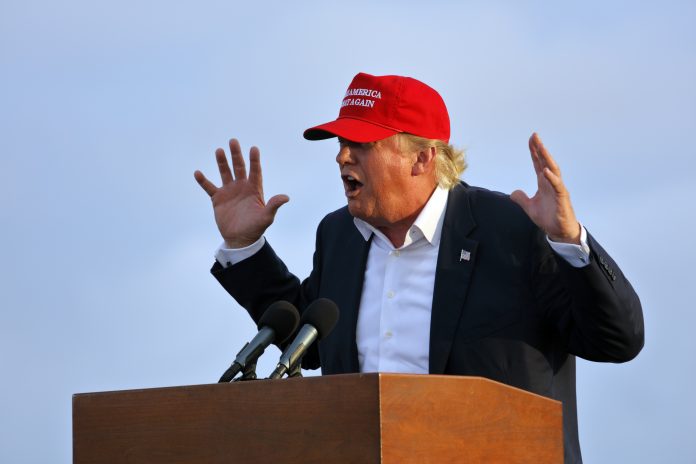Twitter and Facebook froze President Donald Trump’s accounts to discourage the extremists who broke into the Capitol Building – but was it too little, too late?
On 30 September, 2020, President Trump signalled to a White nationalist group that he would need them soon: “Proud boys, stand back and stand by.” Yesterday (6 January), scenes of violence flooded screens across the world, as a mob of pro-Trump extremists broke into the Capitol Building in an attempt to “reverse” the election results. Among them, Proud Boys, holocaust-supporters, individuals waving confederate flags, and QAnon supporters.
These disturbing and surreal scenes overshadowed the Democratic wins in Georgia, and drew the attention of a global audience. Senators were busy debating and then voting to seal President-Elect Joe Biden as the incoming 46th Commander-in-Chief, when police forces outside were overwhelmed by a pro-Trump mob. The crowd surged forward, and forced their way into the building – which they would roam for a further two hours, until a combined force of FBI and National Guard secured the building.
Currently, four people have died. One of those individuals suffered a fatal shooting, while the other three are described as medical emergencies. There have been only 52 arrests, with 26 arrested for entering the Capitol and 4 arrested for unlicensed firearms.
Many commentators are pointing out that there was a significant lack of police brutality, even in the face of extremists planting three bombs around the building.
President Elect Joe Biden commented: “This is not dissent. It is disorder. It is chaos. It borders on sedition. And it must end. Now … To storm the Capitol, to smash windows, to occupy offices, and to threaten the safety of duly elected officials is not protest. It is insurrection.”
The slow-burn of constant misinformation
At midday (GMT), the 12-hour freeze put in place on President Trump’s twitter was lifted. According to Twitter CEO Jack Dorsey, if the President tweets words that could incite further violence, his account will be locked again. President Elect Joe Biden has now been confirmed as the 46th, after Senators returned to the floor yesterday evening.
As a result of the unprecedented and ongoing violent situation in Washington, D.C., we have required the removal of three @realDonaldTrump Tweets that were posted earlier today for repeated and severe violations of our Civic Integrity policy. https://t.co/k6OkjNG3bM
— Twitter Safety (@TwitterSafety) January 7, 2021
Before the breach, President Trump tweeted several statements about the possibility of changing the election results:
The States want to redo their votes. They found out they voted on a FRAUD. Legislatures never approved. Let them do it. BE STRONG!
— Donald J. Trump (@realDonaldTrump) January 6, 2021
While they were immediately marked with the disclaimer of misinformation, critics and commentators are questioning how social media giants acted yesterday. Was there an earlier point of intervention, that could have decreased the violence of the Capitol breach?
Social media as a hyper-subjective reality
In the contemporary climate, social media creates functional realities for politics. When there is a theory like anti-vaccination or holocaust denialism, it can circulate between individuals without any checks and balances, picking up only confirmatory ideas from third parties. This algorithm problem creates a highly subjective loop, which is traditionally how social media functions – you like something, it brings you more of the same – but more than ever, is presenting huge issues for how democracy functions.
Facebook had even implemented a better algorithm for the time of the US Election – they would boost news from “authoritative sources” to everyone’s feeds, as opposed to hyper-partisan ideas that are usually shared in the run-up to a vote. On 16 December, considering the post-Election period to be over, Facebook reverted back to their normal algorithms.
Facebook’s history with violence
Facebook and Twitter have both faced a lot of criticism for their histories with misinformation. Facebook faced direct blame for a situation of misinformation that contributed to a genocide in Myanmar, as posts from the military there supported the dehumanisation of Rohingya Muslims – blaming them for sexual assaults and attacks on Buddhist women. The result is evident today, in the ongoing physical attack on this ethnic group from the controlling party of Myanmar. This digital campaign of rumours and theories, according to the NYT, has been ongoing for roughly five years.
The combination of hatred, election denialism and paranoia that led to the attack on the Senate followed a similar playbook, fed from a similarly authoritative source – President Trump himself.
UK Prime Minister Boris Johnson commented: “Disgraceful scenes in U.S. Congress. The United States stands for democracy around the world and it is now vital that there should be a peaceful and orderly transfer of power.”
While Facebook and Twitter both acted to lock the account and will face scrutiny for how events unfolded on 6 January, there are more substantial ideas about using the 25th Amendment – even from formerly quiet Republicans. With two weeks left till inauguration day, will Congress move to prevent the President from further incitement of violence?











